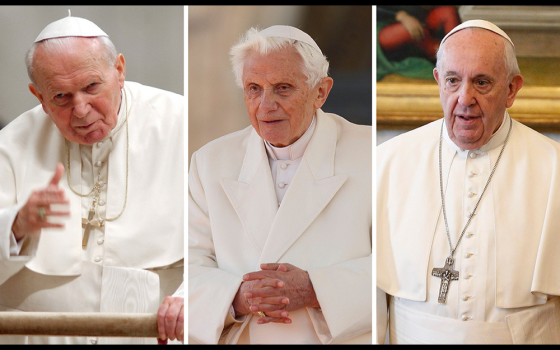Washington journalists don't bend the knee at the name of Jack Shafer, but we all think about it. He has long been a legend since his days editing the Washington City Paper. And, his latest essay at Politico on the wrong headedness of worrying about balance by reporters and editors is well worth the read, despite the quote from the always objectionable Alexander Cockburn at the end. Shafer's argument is especially important this election season.
Shafer is correct when he writes the following:
To denounce balance is a heretical act for a journalist. The idea that reporters should aspire to a Zen-like equilibrium that gives all 'stakeholders' a say in its shaping has become a tenet of the profession's religion. The concept has become so engrained in our culture that those scamps at Fox News Channel have co-opted it with their ridiculous 'fair and balanced' motto. Fox is many things, but fair and balanced is not one of them. But the sheer power of the words seems to paralyze people from laughing out loud when they hear it intoned on Fox.
This phenomenon is worse in broadcast media, like cable news, but it is found in all media. When a journalist finds himself wondering about the "stakeholders" rather than the "subjects of the story," he is getting off-track. When an editor worries about how readers will respond to a certain editorial stance, she is getting off-track. Journalists should pursue the truth as best they can, conscious of the biases we all have to be sure, but not aiming at some false goal of balance as if that would ensure that the journalist got the story right.
Let's take a prosaic example. You are a reporter and you witness a robbery. You recognize both the perpetrator and the victim and write up the story naming which was which. The two subjects of the story will not experience your story the same way, but what you wrote is the truth, the simple objective truth. Yet, the editor must still decide how much attention to give to a story, or whether to assign a story in the first place: Most reporting is not based on what one encounters while walking down the street.
Let's take another prosaic example, one that shifts into more contentious ground. You are a music critic and you assert that this opera was the worst one performed by a given company all year. You will hear howls of objections from the people who produced the failed opera and from their family members, and they are likely to charge you with putting your opinions forward as fact, when they are mere opinions. But we listen to Mozart regularly and not to Salieri for a reason: Mozart is better. I am actually partial to Beethoven's Symphony No. 7, but I admit it is not the musical achievement that the third, fifth or ninth symphonies are. So, there is subjectivity and we can recognize it, but not everything is subjective. You could say that one has a preference for the seventh, but unless you can muster arguments, it remains a mere preference. An opinion requires an argument.
My point is that journalism is never free from value judgments, but that does not mean that there are no objective standards either. Practices like seeking balance are designed to facilitate the search for truth and the removal of bias, but sometimes, like all general rules and practices, it can frustrate that search instead of aiding.
This year, many journalists admit they are in a conundrum because they recognize that if they seek balance between the two presidential candidates, they are not really reporting the truth of the matter. They can say, "On the one hand, Hillary Clinton has this bizarre and self-defeating need for privacy, chose a career in which that need cannot be satisfied, and all sorts of strange, sometimes reprehensible things happen in consequence. She has not proven herself to be especially effectual in politics and her tenure at the State Department was not spectacular. She is exceedingly bright and, in the best and worst sense of the word, the embodiment of the establishment." I worry greatly that hers may be a failed presidency in the sense that it does not address some of the core inequalities in our society, but I can't imagine it will be a disaster: Her political desire to win will keep her from doing anything too insane.
What does the "On the other hand, Donald Trump . . ." look like? It is not that the list is longer, although it is. The problem is that there is no real balance to be had between using a private server for your emails in violation of a State Department rule and fomenting bigotry and xenophobia. There is no real balance between a lifetime of policy work and a lifetime spent screwing subcontractors and workers out of their pay. There is no real balance between a failure to calculate in advance the speed with which ISIS would become a big player in Syria and Iraq and cultivating a bromance with a Russian autocrat. There is a difference between an unhealthy desire for privacy and a psyche that is so transparently and comprehensively narcissistic that it responds to a mass murder by suggesting it proved you were right.
Regrettably, many of the nation's most prominent journalists are products of elite schools where they all received some version of the Pontius Pilate metaphysics, a cynical, oddly condescending, and finally slothful satisfaction with the question "what is truth?" as if there were no answer to the question. Regrettable, too, that so many churchmen were taught to think that any admission of grey was evidence of a descent into relativism and, just so, they became incapable of engaging journalists and many others who shape our culture. No one has a monopoly on the truth. Our answers are never exhaustive. But we can tell the difference between a flawed candidate and a dangerous charlatan. Journalists should recognize that this year, there can be no false equivalence and that the search for it distorts their craft, it does not serve it.
[Michael Sean Winters is NCR Washington columnist and a visiting fellow at Catholic University's Institute for Policy Research and Catholic Studies.]


